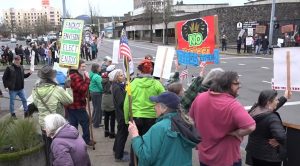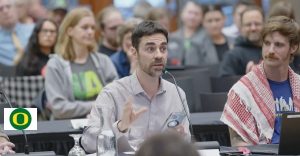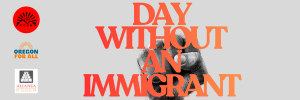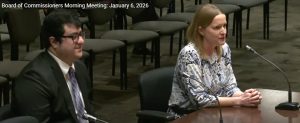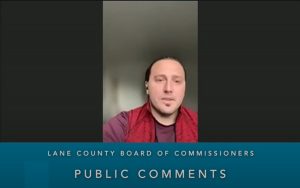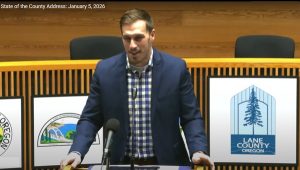Occupy Medical warns volunteers: You may be arrested
7 min read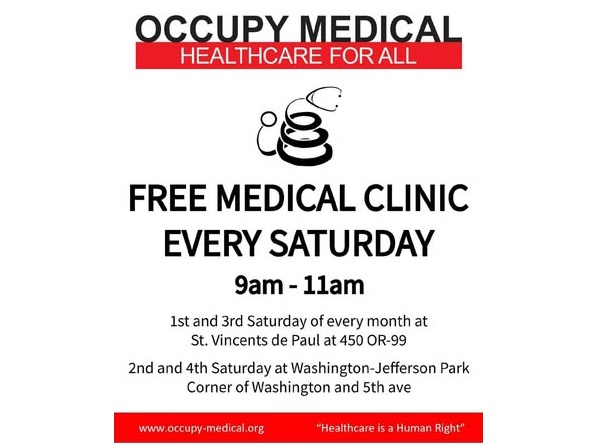
Presenter: Occupy Medical is warning its pre-med volunteers: You might get arrested this weekend. The free street clinic usually sets up near the faith-based groups feeding the hungry in Washington Jefferson Park, but the city denied a permit for Neighbors Feeding Neighbors. On Dec. 13, Dr. William Foster:
[00:00:19] Dr. William Foster: Earlier this week, I sent out an email to all of our pre-med people and included one of the articles that was in the paper (I forget which one, they’re all pretty similar) and said, you know, ‘I just want you to be aware that police might show up and cite you or arrest you.’
[00:00:35] But I said, if I was on a med school admission committee, I would find that intriguing that you’d been arrested and you had to explain, ‘Yeah, I got arrested because I was providing free medical care.’ That would certainly make you stand out from most other people applying to medical school.
[00:00:52] We’ve had our own permit at times, but, you know, I think for the last two, three years, we haven’t. We don’t need one at St. Vinnie’s. They’ve invited us to be there. We wanted to be back at the park. Breakfast Brigade was there, so they said, ‘We’ll just add you on to our permit.’ So technically I think we were listed on their permit, until they lost it this past fall.
[00:01:19] And we’ve never, in the time we’ve been there since this all unfolded earlier this summer, nobody’s come up while we’ve been there and said, ‘Hey, you can’t be here. If you continue to be here, we’re going to cite you and arrest you.’ We’ve never been told that specifically, but we’re only there twice a month. We plan to be there tomorrow, because it’s the second Saturday so we’ll be at the park, you know, tomorrow, and we’ll see what happens.
[00:01:47] ] Initially, for the first five or six years, many of the volunteers were middle-aged or older. Most of our volunteers outside of doctors and nurses have been pre-med students. And so right now we have a very active group of 10 to 15 pre-med students who are seeing a radically different view of medicine than they’re going to see any place else, you know, talking to homeless people.
[00:02:21] And over the years, I’ve kept track of a lot of my pre-med students (as I call them) and I’ve had, you know, probably 10 of them that are in med school or residency right now and each year more apply and all of them have said, you know, my time at Occupy Medical, you know, made a significant impact.
[00:02:38] This is not the plastic surgeon’s office or whatever. This is seeing these people on the street and getting comfortable talking to them. And it’s interesting to see that evolution and a student who shows up, you know, the first day, and is a little bit hesitant to talk to this homeless person who walks up and says, ‘Yeah, I can’t go to the ED anymore because one time I kidnapped a care provider because I couldn’t get the care I wanted,’ you know, I mean, that’s not true. You can never be banned from the emergency department. That’s where I typically work, but it’s just interesting to see how these pre-med students kind of evolve.
[00:03:19] And after a while, they’re very comfortable, you know, sitting there talking with these homeless people, many of them who have pretty significant substance abuse and mental health issues as well.
[00:03:29] When it comes to providing care for the homeless, you really need to meet them where they’re at to get the biggest bang for the buck, and we don’t have any bucks.
[00:03:41] Presenter: Dr. William Foster says Occupy Medical has been meeting them where they are for the last 13 years. He says, ‘We just do it.’
[00:03:49] Dr. William Foster: Occupy Medical has been around since the Occupy Eugene movement back in the fall of 2011. There was actually a little Occupy Eugene movement in the Washington Jefferson Park, you know, at the same time there was the Occupy Wall Street movement.
That movement, Occupy Eugene, at least in the park there, only lasted for a month or two before it was shut down, you know, and the people were moved out. But there was a few providers that thought, hey, ‘There’s these homeless people hanging out, camping down here. Maybe they have medical needs.’
[00:04:25] So a group of people started going, I think, once a week down to the encampment there to meet their needs. And out of that was born Occupy Medical. And since that time, we have probably almost weekly for the last 13 years held a free clinic someplace in Eugene or Springfield.
[00:04:49] Initially, I think we were over in the Park Blocks (where the Saturday Market is) on Sunday. We were there for quite a few years, and we probably had a permit from the city to do that, because that used to be a place where a lot of the homeless hung out 10 years ago, was the Park Blocks there.
[00:05:08] You really need to be where they’re at, you know, you can’t say, ‘Come here.’ You know, you need to go where they’re at. And that’s, you know, the beauty of where we’re meeting right now, which is on the first and third Saturdays of the month we are at the (Eugene) Service Station, the St. Vinnie’s Service Station on (Highway) 99 because that’s certainly a place where a lot of the homeless hang out.
[00:05:31] And then at the Washington Jefferson Park where the Breakfast Brigade or Neighbors Feeding Neighbors is because there’s a large group of people they gather there. You know, we want to go where there’s people, so it’s easy for them to say, ‘Hey, yeah, I need to see the doctor about this or about that.’
[00:05:50] And so, yeah, we’ve probably been at those two locations for the last couple of years now.
[00:05:57] One of the other bits of history of Occupy Medical is back when COVID first hit. There was a real fear, you know, in public health that what if COVID got into these homeless camps, they could just wreak havoc, you know, if people were living in these, you know, small tents and stuff.
[00:06:16] So there was, you know, lots of money floating around in COVID and so Lane County Public Health asked Occupy if they would set up what became known as ‘The COVID Motel.’ And so we had a couple of different locations where basically somebody who was homeless that was diagnosed with COVID either in the ED (Emergency Department) wasn’t sick enough to be admitted to the hospital or he’d been in the hospital and didn’t need to be there but still needed a quarantine, came out and stayed in our motel that we ran for about two years.
[00:06:51] So, at that point, we went from an organization that had a budget of $20,000 a year in donations and no full-time employees to over a million-dollar budget and 50 employees. So we did have some issues back there that were painful organizationally (not for the care we provided) and since then we’ve gone back to small peanuts, and I think that’s one thing that’s allowed us to continue on for so long is, you know: We just do it.
[00:07:21] I’m not speaking poorly of White Bird or anybody else, but over the years, there’s been so many times where some money comes available in some grant and some organization stands up something to help the homeless and it goes on for a year or whatever.
[00:07:38] And then the grant money goes away and the program ends, you know? And we’ve seen a fair amount of that over time. And it, well, it’s great what they were doing, but then the money goes away and the program goes away. And that’s one thing about Occupy, we just kind of keep on doing it on a shoestring.
[00:07:57] I have three – four doctors that are pretty dedicated, a couple of nurses, my wife, the physical therapist that shows up. And these very eager pre-med students and so, we see ourselves, continuing doing what we’ll do, where we are kind of depends on where we see the greatest need. And Lane County is supposed to be rolling out some street medicine clinic based on that $4 million they got from that UD closing and that Senate bill and stuff. And so they might start doing something over at the service station. And if they do, we might move someplace else. I don’t know if there needs to be a free clinic there twice a week, we might find a different location.
[00:08:43] You know, it’s become harder. During COVID, there was large camps every place we could go to. But now those camps are continually being moved and swept. So it’s harder to have places to go where there’s large number of people. They’re kind of all over the place, moving around. And that’s why the breakfast is a great place. And then the service station, where a lot of them hang out, is a great place because there’s always lots of people there.
[00:09:12] I can’t speak specifically for Breakfast Brigade or Neighbors Feeding Neighbors, they’re called, but we would, they would love, we would, they and us would love to have a place where there’s a little bit of shelter over us, so we don’t get wet. That’s one nice thing about there, we’re kind of underneath the overpass, so it’s a little bit dry, when it’s raining hard. You know, we would love to have a place that would let us, you know, feed and provide medical care, but I don’t think anybody says, ‘Oh, use my parking lot or use my sidewalk.’ Nobody really wants it in their neighborhood.
[00:09:44] Presenter: Dr. William Foster with Occupy Medical, offering its free street clinic every second and fourth Saturday at Washington Jefferson Park. Check out their website at occupy-medical.org.
